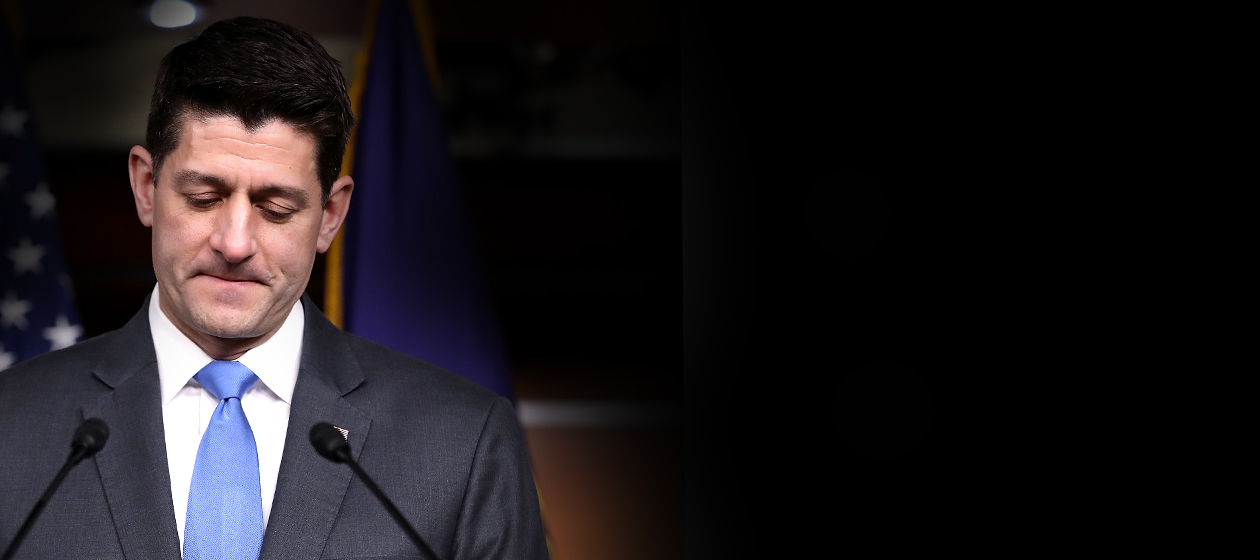Paul Ryan's retirement marks the end of the sunny conservative
Here's what history will remember about the outgoing House speaker


A free daily email with the biggest news stories of the day – and the best features from TheWeek.com
You are now subscribed
Your newsletter sign-up was successful
Speaker Paul Ryan's announcement this morning that he will retire from Congress at the end of his term was a familiar scene. The year is different, the main character is different, the immediate circumstances are different, but the dramatic arc is identical: Paul Ryan was swallowed by the same forces that devoured Eric Cantor and John Boehner before him — the same forces that gave us Donald Trump.
Ryan, the earnest Wisconsin lawmaker and former vice presidential candidate quite plausibly has tired of being a long-distance dad to his three teenaged children. At his announcement, he sang notes in the key of "Mission Accomplished." "I like to think I've done my part, my little part in history to set us on a better course," he said. But there was a lachrymose violin playing in the background. Paul Ryan, politically speaking, is a broken man.
Boehner, the former GOP speaker from Ohio, Cantor, the former Majority Leader from Virginia, and now Ryan: each of these men, to varying degrees, were in the political vanguard of intellectual conservatism, the movement that captured the House in 1994 and changed the face of Washington forever. I have been acquainted with all three of them personally; I do not believe either one of them cynically believed the movement was a ruse to deliver goods to owners of capital while torquing up the white working class with more viscerally satisfying campaigns of ethnic resentment of religious revanchism.
The Week
Escape your echo chamber. Get the facts behind the news, plus analysis from multiple perspectives.

Sign up for The Week's Free Newsletters
From our morning news briefing to a weekly Good News Newsletter, get the best of The Week delivered directly to your inbox.
From our morning news briefing to a weekly Good News Newsletter, get the best of The Week delivered directly to your inbox.
Yet that it is what the Republican Party has become. Donald Trump did not "hijack" it. He is the culmination of the very darkest elements of a pragmatic bargain that began in the campaigns of Barry Goldwater and, later, Richard Nixon. The Tea Party, so-called liberty conservatism" or "constitutional conservatism," the alt-right — these splinter movements within the Republican firmament joined fantastical fiscal radicalism to the ethnic, racial, religious, and class resentments that bind the Republican coalition.
The arrow of the southern strategy, and of "white flight," pointed logically to birtherism and travel bans. Trump did not engineer this moral and intellectual declension. He's simply its latest and most successful champion.
Cantor, Boehner, and Ryan genuinely believed in the Sunny Side of Conservatism, the optimism of Ronald Reagan and Jack Kemp. They believe that reducing taxes and lightening the burden of regulation on businesses leads to innovation and growth. Importantly, they welcomed newcomers from abroad to contribute to such growth and innovation. Did they also believe that tax cuts are self-financing? Were they hypocritical and opportunistic in their denunciation of debt and deficits when their party occupied the White House? Yes — but that's an argument for a different day.
For now, I'm feeling a twinge of sorrow. I'm thinking of Boehner's then-surprising commitment, in the early 2000s, to education reform. Perhaps the resulting legislation (No Child Left Behind) failed to deliver results — but Boehner's desire to secure a better future for underprivileged children was deeply felt. I'm thinking of Ryan's fascination with the social-policy implications of the Catholic doctrine of "subsidiarity." Over the years, I came to believe that Ryan's ideological conservatism had hardened into its own sort of reverse-progressivism — an almost utopian fantasy of how much the absence of government could accomplish in the real world. But it's an error that's distinctly preferable to the hate-filled fantasies of Making America 1955 Again.
A free daily email with the biggest news stories of the day – and the best features from TheWeek.com
Finally I'm thinking of Cantor's primary concession speech in 2014, in which he said:
What I set out to do, and what the agenda that I have said we're about, is, we want to create a Virginia and an America that works for everybody. And we need to focus our efforts as conservatives, as Republicans, on putting forth our conservative solutions, so that they can help solve the problems for so many working middle-class families that may not have the opportunity that we have. [Cantor]
Cantor realized, too late, that conservative ideas, if they were to have any purchase in 21st-century America, would have to answer a different set of questions than they did in 1979. Two years after Cantor was dispatched, someone did rise up in the Republican Party to answer the peal of populism. That someone was Donald Trump.
His ascendance marks the end of Boehner-Cantor-Ryan conservatism. However much Paul Ryan feels he accomplished over the last 18 months will pale in comparison to the existential demise to which he, exhausted, permitted to happen on his watch.
History will remember that more than it will the impact of reversible tax cuts.
Scott Galupo is a freelance writer living in Virginia. In addition to The Week, he blogs for U.S. News and reviews live music for The Washington Post. He was formerly a senior contributor to the American Conservative and staff writer for The Washington Times. He was also an aide to Rep. John Boehner. He lives with his wife and two children and writes about politics to support his guitar habit.
-
 Why are election experts taking Trump’s midterm threats seriously?
Why are election experts taking Trump’s midterm threats seriously?IN THE SPOTLIGHT As the president muses about polling place deployments and a centralized electoral system aimed at one-party control, lawmakers are taking this administration at its word
-
 ‘Restaurateurs have become millionaires’
‘Restaurateurs have become millionaires’Instant Opinion Opinion, comment and editorials of the day
-
 Earth is rapidly approaching a ‘hothouse’ trajectory of warming
Earth is rapidly approaching a ‘hothouse’ trajectory of warmingThe explainer It may become impossible to fix
-
 The billionaires’ wealth tax: a catastrophe for California?
The billionaires’ wealth tax: a catastrophe for California?Talking Point Peter Thiel and Larry Page preparing to change state residency
-
 Bari Weiss’ ‘60 Minutes’ scandal is about more than one report
Bari Weiss’ ‘60 Minutes’ scandal is about more than one reportIN THE SPOTLIGHT By blocking an approved segment on a controversial prison holding US deportees in El Salvador, the editor-in-chief of CBS News has become the main story
-
 Has Zohran Mamdani shown the Democrats how to win again?
Has Zohran Mamdani shown the Democrats how to win again?Today’s Big Question New York City mayoral election touted as victory for left-wing populists but moderate centrist wins elsewhere present more complex path for Democratic Party
-
 Millions turn out for anti-Trump ‘No Kings’ rallies
Millions turn out for anti-Trump ‘No Kings’ ralliesSpeed Read An estimated 7 million people participated, 2 million more than at the first ‘No Kings’ protest in June
-
 Ghislaine Maxwell: angling for a Trump pardon
Ghislaine Maxwell: angling for a Trump pardonTalking Point Convicted sex trafficker's testimony could shed new light on president's links to Jeffrey Epstein
-
 The last words and final moments of 40 presidents
The last words and final moments of 40 presidentsThe Explainer Some are eloquent quotes worthy of the holders of the highest office in the nation, and others... aren't
-
 The JFK files: the truth at last?
The JFK files: the truth at last?In The Spotlight More than 64,000 previously classified documents relating the 1963 assassination of John F. Kennedy have been released by the Trump administration
-
 'Seriously, not literally': how should the world take Donald Trump?
'Seriously, not literally': how should the world take Donald Trump?Today's big question White House rhetoric and reality look likely to become increasingly blurred
